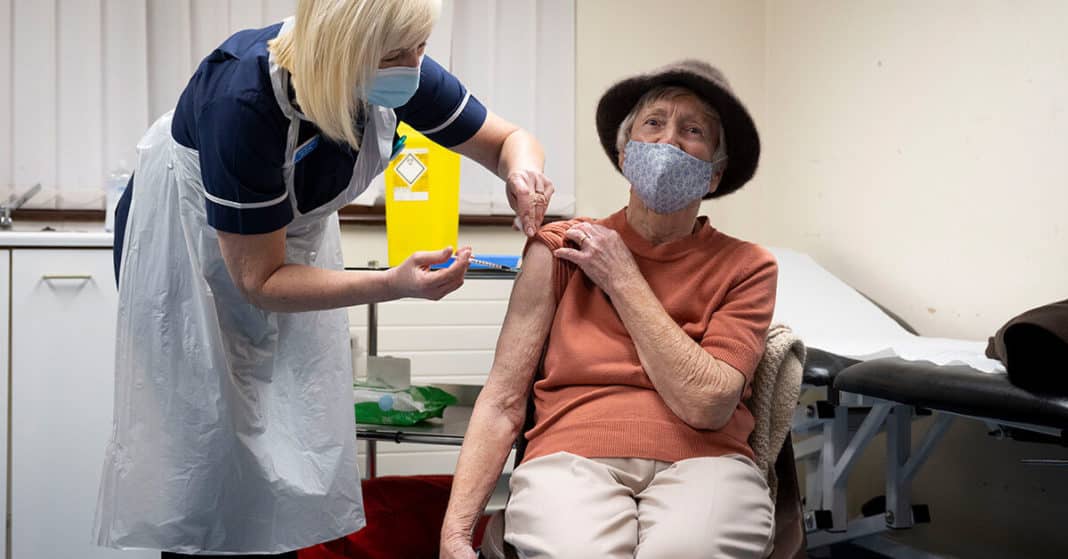The Ministry of Health has promoted the fulfilment of one of the objectives set in the Conference of Presidents on July 22: to ensure that 80 percent of those over 60 in Spain have their booster dose of the COVID-19 vaccine before the end of the year.
This percentage was achieved last Tuesday and in the statistics of yesterday Wednesday it had already exceeded 81.3%.
This is clear from the ‘Complying’ accountability report that has been presented this week by the President of the Government, Pedro Sánchez, in its section corresponding to the area headed by the Minister of Health, Carolina Darias.
With regard to the vaccination campaign, it should be noted that Spain has managed to reach almost 90 percent of its population over 12 years vaccinated with the full schedule and that the paediatric vaccination campaign began weeks ago, with which already on 25,8 percent of boys and girls between 5 and 11 years old.
But the objective of protecting the Spanish population against COVID-19 has not diminished that of protecting the world population, aware that we must all get out of this pandemic. For this reason, more than 45 million doses of vaccines have been donated to countries in Latin America and Africa.
Thus, the commitment to reach 30 million doses donated before the end of 2021 has been exceeded and the goal of donating 50 million doses in the first quarter of 2022 is close to being met.
This same document highlights other objectives that the Ministry of Health has achieved in this last semester where it has had to reconcile its leadership at the head of the management of the pandemic and its work of coordination with the Autonomous Communities and Cities in the vaccination campaign with the impulse to important changes in health matters.
Among them, in the second semester of the year, the Mental Health Strategy was updated and approved within the Interterritorial Council of the National Health System, for the first time in more than a decade, and the 2021-2024 Action Plan was presented. Mental Health and COVID-19 to address the impact caused by the pandemic.
One of the important lessons of the COVID-19 pandemic is the importance of increasing resources for public health, not only for epidemiological surveillance but also to promote healthy lifestyles. For this reason, an increase in the items for Public Health has been foreseen in the PGE-22.
In addition to this document, the Ministry of Health works under the One Health concept, that is, with an integrative perspective on the interaction of human, environmental and animal health. For this reason, it has approved, together with other public administrations, the Strategic Health and Environment Plan (PESMA) aimed at protecting the population from environmental risks, and which was approved at the Health (CISNS) and Environment sector conferences.
In this sense, the Ministry of Health has consolidated its network of collaboration with social and educational agents, such as schools or municipal administrations, to strengthen actions in the promotion of health. Several seminars have been held in collaboration with the Spanish Federation of Municipalities and Provinces to promote health promotion.
The Call for aid has also been launched to the EELL belonging to the Spanish Network of Healthy Cities (RECS) for the development of actions in health matters, as well as to the EELL, belonging or not to the RECS, for the local implementation of the Health Promotion and Prevention Strategy in the National Health System.
Worthy death
The Ministry of Health, within the mandate and roadmap of this Government of Progress, has promoted one of the laws most demanded by society: the Organic Law to regulate euthanasia, in addition to including the right to a dignified death in the portfolio of services of the National Health System.
In addition, the health care guarantee funds (FOGA) and the health cohesion fund have been activated and endowed with a budget. In addition, the Draft Law on measures for equity, universality and cohesion of the National Health System (SNS) with the aim of preventing new health co-payments as established in the past, with special protection for the most vulnerable.
Among the most relevant commitments are the approval of the Oral Health Plan and expanding the portfolio of services to prioritize groups of children and adolescents, pregnant women, people with intellectual disabilities and mobility problems.
Another of the strategic lines of the Ministry of Health is the promotion of technological renewal through the INVEAT Plan with which all high-tech equipment with more than 12 years in the field of Specialized Attention will be renewed or replaced throughout Spain, with the largest investment that has been made in our country in this sector with a contribution of 800 million euros.
In this sense, the Collaboration Agreement for collaboration in the implementation of proton therapy in the National Health System has been signed.
Regarding transplants, the extension has been published and the Agreement for the development of the transplantation program for hematopoietic progenitors of unrelated donors has been modified and the International Administrative agreement has been approved for the period 2021-22 to carry out activities of cooperation on donation and transplantation of human organs, cells and tissues
Sexist violence
The Ministry of Health is involved in the protection of women victims of sexist violence and, therefore, has developed a validated instrument for the early detection of cases of Gender Violence during the clinical interview.
In addition, three training courses have been launched between the Women’s Health Observatory and the National School of Health, to train health professionals in the use of the early detection instrument-questionnaire. The agreement for the implementation of the Sanitary Measures of the Catalogue of Urgent Measures of the Improvement and Modernization Plan against Gender Violence has also been approved.





